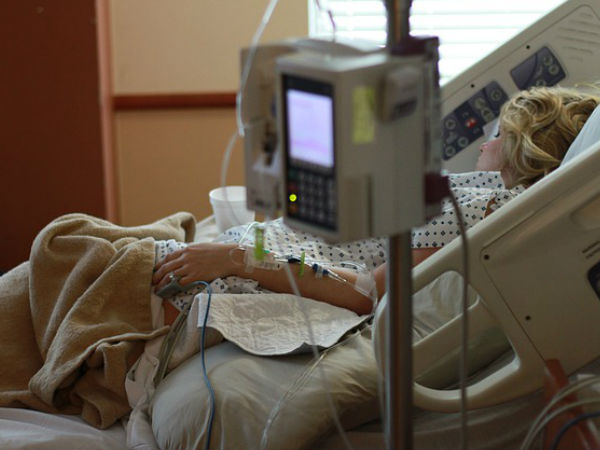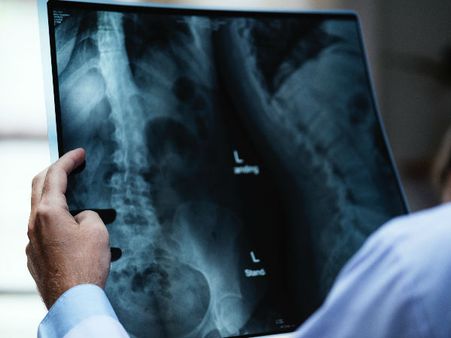Just In
- 10 min ago

- 9 hrs ago

- 12 hrs ago

- 14 hrs ago

Don't Miss
- Sports
 IPL 2024: Sunrisers Hyderabad's Reign of Beauties: SRH Chronicles Through Kavya Maran and Gayatri Reddy
IPL 2024: Sunrisers Hyderabad's Reign of Beauties: SRH Chronicles Through Kavya Maran and Gayatri Reddy - Finance
 Rs 17-26/Share Dividend: 1 Auto, 1 Textile Stock To Turn Ex-Dividend From April 18-19
Rs 17-26/Share Dividend: 1 Auto, 1 Textile Stock To Turn Ex-Dividend From April 18-19 - Movies
 Bade Miyan Chote Miyan Vs Maidaan Box Office Collection Day 5: THIS Film Wins First Monday Test
Bade Miyan Chote Miyan Vs Maidaan Box Office Collection Day 5: THIS Film Wins First Monday Test - News
 Israel Will Respond Soon To Iran's Missile Attack, Says Israel Military Chief
Israel Will Respond Soon To Iran's Missile Attack, Says Israel Military Chief - Education
 NEET PG 2024: Check the Registration and Exam Date Here
NEET PG 2024: Check the Registration and Exam Date Here - Automobiles
 Navigating Through Car Insurance Options: A Guide For Indian Drivers
Navigating Through Car Insurance Options: A Guide For Indian Drivers - Technology
 Xiaomi Smarter Living 2024 Set For April 23 in India; What to Expect?
Xiaomi Smarter Living 2024 Set For April 23 in India; What to Expect? - Travel
Maximise Your First Indian Adventure With These Travel Tips
Peripartum Cardiomyopathy: What You Should Know
Very rarely, during or after pregnancy, a mother can develop a type of heart condition called peripartum cardiomyopathy. Peripartum cardiomyopathy (PPCM) is a rare kind of heart failure that happens during the last month of pregnancy or within five months after delivery.
The term 'cardiomyopathy' refers to heart muscle disease. Peripartum cardiomyopathy is also referred to as 'postpartum cardiomyopathy'. It is a rare condition with mild or severe symptoms.

In peripartum cardiomyopathy, the heart chambers enlarge and the heart muscle weakens. This causes a decrease in percentage of blood ejected from the left ventricle of the heart, with each contraction, thereby resulting in reduced blood flow, and the heart is unable to meet the demands of the body organs for oxygen. This affects the liver, lungs, and other body systems.

What Causes Peripartum Cardiomyopathy?
Generally, the heart pumps 50 per cent more blood during pregnancy, as there is increased need of transferring oxygen and vital nutrients to the developing baby. Although there is no definite cause for peripartum cardiomyopathy, one reason as suggested by the doctors is when this additional pumping of blood, is combined with few other risk factors that places additional stress on the heart.

Such risk factors may include
•
Having
previous
pregnancies
with
similar
condition
•
Viral
illness
•
Low
immunity
•
Small-vessel
disease
•
Genetics
•
Coronary
artery
spasm
•
Poor
nutrition
•
Obesity
•
Certain
medications
•
Advanced
maternal
age
(women
over
30
or
35
years
of
age)
•
Preeclampsia
•
Smoking
and
alcoholism

Symptoms Of Peripartum Cardiomyopathy
The symptoms of peripartum cardiomyopathy are similar to that of heart failure. You may experience the following common symptoms:
•
Rapid
heartbeat
or
palpitation
•
Severe
fatigue
•
Chest
pain
•
Shortness
of
breath
•
Tiredness
during
physical
activity
•
Increased
urination,
particularly
at
night
•
Swollen
feet
and
ankles

How Is It Diagnosed?
Your doctor can listen to any crackling noises in the lungs or abnormal sounds in the heart using a stethoscope. Your blood pressure may also be monitored.
Several imaging tests are done to measure your heart and determine the rate of blood flow. These tests include chest X-ray, CT scan of the heart, nuclear heart scan, and echocardiogram.
Laboratory tests are also part of the evaluation. Tests to assess kidney, liver and thyroid functioning, and to assess sodium and potassium, and a complete blood count to look for anaemia or infection is done. Further, markers of cardiac injury and stress may also be used to assess levels of risk.
The seriousness of the condition is measured by ejection fraction, based on the percentage of blood the heart pumps out with each beat. Normal ejection fraction number is about 60 per cent.

Treatment Options
Early diagnosis is the most effective treatment. Therefore, heightened suspicion is important when a pregnant woman comes in with signs of heart failure, as early diagnosis can help in getting the treatment started early on.
It is better to begin with standard heart failure therapy in case of peripartum cardiomyopathy, making use of available protocols.
The treatment for peripartum cardiomyopathy involves keeping extra fluid from getting collected in the lungs and to help the heart recover as completely as possible. Several women recover normal heart function and stabilize on medicines. Rarely, in some cases, it may progress to severe heart failure, requiring mechanical support or heart transplantation.
In majority of the cases, the physician prescribes treating symptoms with safe medications during pregnancy or for women who are breastfeeding. Doctors may also recommend a low-salt diet, daily weighing, or fluid restrictions. Smoking or drinking alcohol should be stopped completely, as they can worsen symptoms.
A heart biopsy may help to determine the underlying cause of cardiomyopathy, but the procedure is uncommon.

Lifestyle Modifications
Some lifestyle modifications can help reduce the risk, especially for first-time mothers. So the focus should be on the following:
Regular
exercise
(mild
form
of
exercise
that
is
not
too
strenuous)
Eating
low-fat
diet
Avoid
all
kinds
of
junk
foods
Avoid
smoking
and
alcohol
Remain
relaxed
and
stress-free
Include
prayer,
yoga
and
meditation
in
your
routine

What Are The Complications Involved?
Depending on the severity, generally, women who develop this condition during pregnancy may have their hearts returning to normal post-delivery. But for some, their condition may continue to worsen, and in such cases a heart transplant may be necessary.
Severe complications of peripartum cardiomyopathy may include arrhythmia (irregular heartbeat), blood clots in the lungs, congestive heart failure and death.
If you have experienced peripartum cardiomyopathy, then discuss with your doctor about possible complications before going ahead with a second pregnancy. This is because for patients with left ventricular dysfunction, if it fails to normalize during follow-up, the risk of further deterioration is higher during subsequent pregnancies, and this may pose danger to the life of the mother.
-
 healthSolar Eclipse 2024: Dos and Don'ts for Pregnant Women During Surya Grahan
healthSolar Eclipse 2024: Dos and Don'ts for Pregnant Women During Surya Grahan -
 healthLunar Eclipse 2024: Dos And Don'ts For Pregnant Woman During Chandra Grahan
healthLunar Eclipse 2024: Dos And Don'ts For Pregnant Woman During Chandra Grahan -
 fashionDeepika Padukone-Ranveer Singh Announce Pregnancy: 6 Maternity Outfit Ideas For The Modern Mom-to-Be
fashionDeepika Padukone-Ranveer Singh Announce Pregnancy: 6 Maternity Outfit Ideas For The Modern Mom-to-Be -
 healthLate Singer Sidhu Moose Wala's Mother Is Pregnant Through IVF, Know What It Is And How To Prepare For It
healthLate Singer Sidhu Moose Wala's Mother Is Pregnant Through IVF, Know What It Is And How To Prepare For It -
 insyncVirat Kohli And Anushka Sharma Name Their Baby Boy 'Akaay', Know What This Beautiful Name Means?
insyncVirat Kohli And Anushka Sharma Name Their Baby Boy 'Akaay', Know What This Beautiful Name Means? -
 pregnancy parentingMaternal Health Awareness Day 2024: 15 Foods That Boost Maternal Health
pregnancy parentingMaternal Health Awareness Day 2024: 15 Foods That Boost Maternal Health -
 pregnancy parentingFrom Contractions To Water Breaking: Knowing When It's Time For The Hospital During Pregnancy
pregnancy parentingFrom Contractions To Water Breaking: Knowing When It's Time For The Hospital During Pregnancy -
 pregnancy parentingBirth Control Pills Can Affect This Primary Function In Women: Find Out What
pregnancy parentingBirth Control Pills Can Affect This Primary Function In Women: Find Out What -
 pregnancy parentingTwo Wombs, Four Hearts: US Mom's Extraordinary Double Uterus Pregnancy
pregnancy parentingTwo Wombs, Four Hearts: US Mom's Extraordinary Double Uterus Pregnancy -
 healthExclusive: A Pregnant Mom Can Posses These Maternal, Fetal Health Risks If Exposed To Air Pollution
healthExclusive: A Pregnant Mom Can Posses These Maternal, Fetal Health Risks If Exposed To Air Pollution -
 pregnancy parentingDelhi Air Pollution: Pregnant Women Must Follow These 4 Things!
pregnancy parentingDelhi Air Pollution: Pregnant Women Must Follow These 4 Things! -
 pregnancy parentingDelhi Air Quality Crisis: How Air Pollution Can Affect Unborn And Newborn Babies? Precaution Tips For Pregnant
pregnancy parentingDelhi Air Quality Crisis: How Air Pollution Can Affect Unborn And Newborn Babies? Precaution Tips For Pregnant


 Click it and Unblock the Notifications
Click it and Unblock the Notifications



